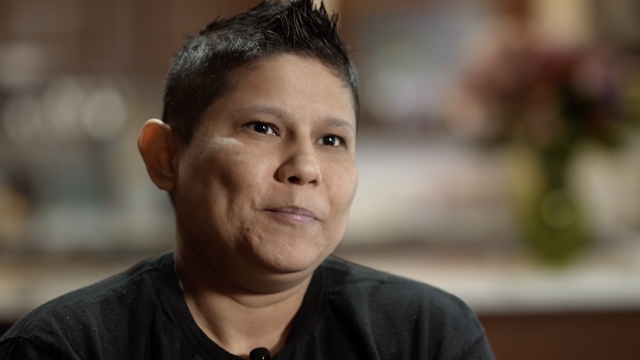When Annabel "Annie" Reyes joined the Navy in 2007, she expected to spend most of her life serving her country. But a lifelong dream of military service was cut short just two years later after Reyes was kicked out of the military for being gay under the now repealed "Don't Ask, Don't Tell" policy.
"It didn't hit me at first because it happened so fast and I wasn't expecting to get kicked out," Reyes explained, sitting in the living room of her Massachusetts home.
Because Reyes was involuntarily discharged for "homosexual conduct, she wasn't eligible to receive veteran benefits. And she is hardly alone.
Between World War II and 2011 — when Don't Ask, Don't Tell was repealed — the U.S. Department of Veterans Affairs estimates more than 100,000 service members were discharged because of their sexual orientation. The policy was intended to allow gay, lesbian and bisexual people to serve in the military as long as they hid their sexual orientation.
SEE MORE: 30 years after 'Don't Ask, Don't Tell,' gay airman reflects on serving
Tens of thousands of LGBTQ+ veterans now have no access to veteran benefits like health care, VA loans or mental health services because of the way they were discharged.
"Why are we risking our lives for a country that is so concerned about the people you're sleeping with? That they'd rather get rid of a good sailor than let people live their lives," Reyes said. "If we are going have the goal of being the best country in the world, we should prove it."
Peter Perkowski, a clinical instructor for the Legal Services Center at Harvard Law School, has spent years trying to help veterans like Reyes.
"Their service deserves to be recognized as honorable," Perkowski explained. "For me, it's about Justice. I didn't serve in the military, but the people who did deserve the things they've earned."
Perkowski and his colleagues are currently helping dozens of LGBTQ+ veterans working to have benefits restored. Most aren't eligible for VA benefits right now due to the character of their discharge.
"It's all about righting the historical wrongs, and I don't think the administration or Pentagon grasp the size and scope of the problem," Perkowski added.
SEE MORE: Veteran suicide prevention project helps recognize signs of trouble
Earlier this year, the Department of Defense announced it would proactively be reviewing records of military veterans discharged because of their sexual orientation, and a new website has been launched to help veterans with their appeals process. The DOD's website reads that the department is "committed to increasing its efforts to reach LGBTQ+ veterans discharged under less than honorable conditions for homosexual conduct."
"I'm glad there is attention being paid to this. It's better than being ignored," Perkowski added. "Even incremental progress is progress."
These days, Annie Reyes has embarked on a new mission: motherhood. Reyes and her wife recently welcomed their second child. All the while, the 40-year-old continues to wait for her appeals to go through.
She started the process eight years ago but still hasn't received all of the VA benefits other veterans are eligible for. Reyes said she hopes that other LGBTQ+ veterans see her story and are compelled to come forward.
"As hard as it is to talk about it, if it helps anyone else to stay and fight, then it's worth it," she said.
Trending stories at Scrippsnews.com




